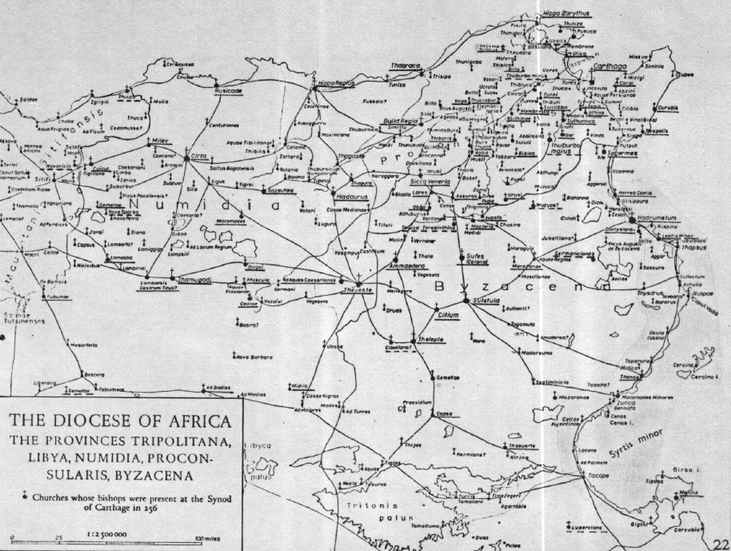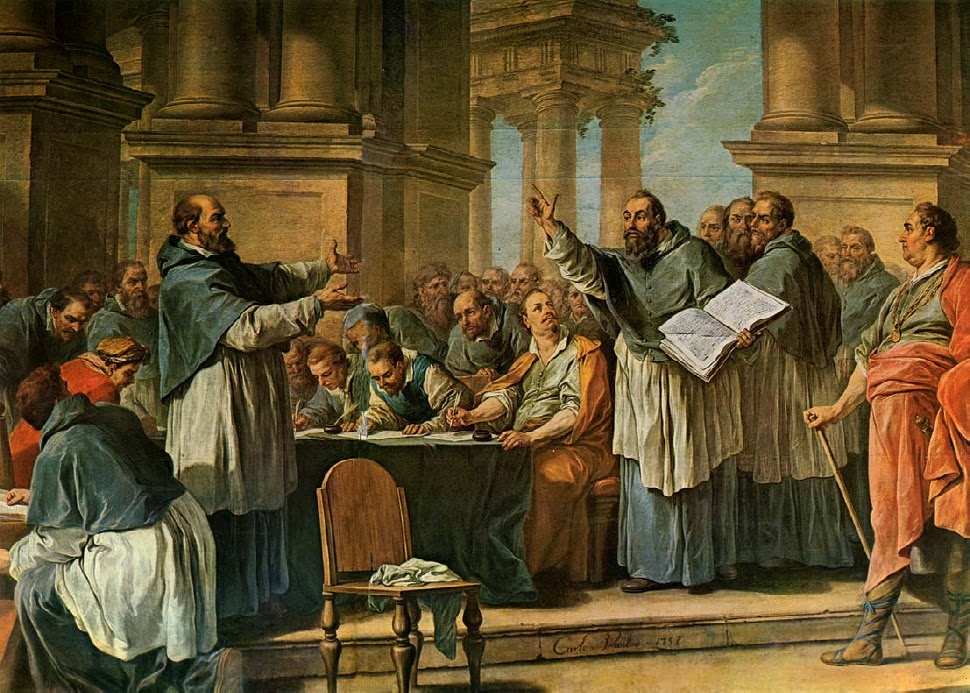Majorinus on:
[Wikipedia]
[Google]
[Amazon]
 Majorinus was the leader of a
Majorinus was the leader of a

p65
and the relatively short tenure of his leadership had reduced his actual impact on history.
 Majorinus was the leader of a
Majorinus was the leader of a schismatic
Schismatic may refer to:
* Schismatic (religion), a member of a religious schism, or, as an adjective, of or pertaining to a schism
* a term related to the Covenanters, a Scottish Presbyterian movement in the 17th century
* pertaining to the sch ...
Christian
Christians () are people who follow or adhere to Christianity, a monotheistic Abrahamic religion based on the life and teachings of Jesus Christ. The words '' Christ'' and ''Christian'' derive from the Koine Greek title ''Christós'' (Χρ ...
sect in Roman North Africa
Africa Proconsularis was a Roman province on the northern African coast that was established in 146 BC following the defeat of Carthage in the Third Punic War. It roughly comprised the territory of present-day Tunisia, the northeast of Algeria, ...
known as the Donatists
Donatism was a Christian sect leading to a schism in the Church, in the region of the Church of Carthage, from the fourth to the sixth centuries. Donatists argued that Christian clergy must be faultless for their ministry to be effective and the ...
.
Life
Very little is known of his early life, asDonatist
Donatism was a Christian sect leading to a schism in the Church, in the region of the Church of Carthage, from the fourth to the sixth centuries. Donatists argued that Christian clergy must be faultless for their ministry to be effective and the ...
writings were mostly destroyed in the following years. What we can garner of his life and beliefs is accessed through what his enemies said against him.
He had been a reader or a lector
Lector is Latin for one who reads, whether aloud or not. In modern languages it takes various forms, as either a development or a loan, such as french: lecteur, en, lector, pl, lektor and russian: лектор. It has various specialized uses.
...
in the church at Carthage
Carthage was the capital city of Ancient Carthage, on the eastern side of the Lake of Tunis in what is now Tunisia. Carthage was one of the most important trading hubs of the Ancient Mediterranean and one of the most affluent cities of the clas ...
, during the time that Caecilianus
Caecilianus, or Caecilian, was archdeacon and then bishop of Carthage in 311 AD. His appointment as Bishop led to the Donatist Controversy of the Late Roman Empire. He was also one of only five Western bishops at the First Council of Nicea.
Bac ...
, had been an archdeacon
An archdeacon is a senior clergy position in the Church of the East, Chaldean Catholic Church, Syriac Orthodox Church, Anglican Communion, St Thomas Christians, Eastern Orthodox churches and some other Christian denominations, above that of m ...
at Carthage and Mesurius was Bishop of Carthage
The Archdiocese of Carthage, also known as the Church of Carthage, was a Latin Catholic diocese established in Carthage, Roman Empire, in the 2nd century. Agrippin was the first named bishop, around 230 AD. The temporal importance of the city ...
. He seems to have also had some domestic office in the household of a Roman noble
A noble is a member of the nobility.
Noble may also refer to:
Places Antarctica
* Noble Glacier, King George Island
* Noble Nunatak, Marie Byrd Land
* Noble Peak, Wiencke Island
* Noble Rocks, Graham Land
Australia
* Noble Island, Grea ...
woman Lucilla.
In 311 he was chosen as Bishop of Carthage
The Archdiocese of Carthage, also known as the Church of Carthage, was a Latin Catholic diocese established in Carthage, Roman Empire, in the 2nd century. Agrippin was the first named bishop, around 230 AD. The temporal importance of the city ...
, by a council of 70 bishops in Cirta
Cirta, also known by various other names in antiquity, was the ancient Berber and Roman settlement which later became Constantine, Algeria.
Cirta was the capital city of the Berber kingdom of Numidia; its strategically important port city ...
led by Secundus of Tigisis. Secundus of Tigisis was the primate of Numidia
Primates are a diverse order of mammals. They are divided into the strepsirrhines, which include the lemurs, galagos, and lorisids, and the haplorhines, which include the tarsiers and the simians (monkeys and apes, the latter including ...
and as such was meant to be consulted prior to the appointment of Caecilianus.
This appointment was intended to depose the existing recently appointed bishop
A bishop is an ordained clergy member who is entrusted with a position of authority and oversight in a religious institution.
In Christianity, bishops are normally responsible for the governance of dioceses. The role or office of bishop is ...
Caecilianus
Caecilianus, or Caecilian, was archdeacon and then bishop of Carthage in 311 AD. His appointment as Bishop led to the Donatist Controversy of the Late Roman Empire. He was also one of only five Western bishops at the First Council of Nicea.
Bac ...
. Caecilianus had been the understudy of the recently deceased bishop Mensurius Mensurius was a bishop of Carthage in the early 4th century during the early Christian Church.
During the Christian persecution of Diocletian he evaded turning over sacred scriptures to the Roman authorities, but was nevertheless considered a t ...
considered by many to be a traditor
Traditor, plural: ''traditores'' (Latin), is a term meaning "the one(s) who had handed over" and defined by Merriam-Webster as "one of the Christians giving up to the officers of the law the Scriptures, the sacred vessels, or the names of their br ...
during the Diocletianic Persecution
The Diocletianic or Great Persecution was the last and most severe persecution of Christians in the Roman Empire. In 303, the emperors Diocletian, Maximian, Galerius, and Constantius issued a series of edicts rescinding Christians' legal ri ...
, though Mensurius denied the charges. Saying instead that he had hidden Christians and church property.
The Council, however, held that Mensurius was traditor and that sacraments administered by Caecilianus were thus invalid. The situation was further complicated by the fact that Caecilianus was consecrated by Felix of Aptunga, another traditor.
However rather than depose Caecilianus, his appointment created a three-hundred-year-long schism in North African Christendom
Christendom historically refers to the Christian states, Christian-majority countries and the countries in which Christianity dominates, prevails,SeMerriam-Webster.com : dictionary, "Christendom"/ref> or is culturally or historically intertwin ...
that would radically shape the intellectual life of Christianity.
Opponents
Virtually everything we know of Majorinus comes from his enemies, many of whom did not hold back on their condemnation of him:Optatus
Optatus
Saint Optatus, sometimes anglicized as St. Optate, was Bishop of Milevis, in Numidia, in the fourth century, remembered for his writings against Donatism.
Biography and context
Optatus was a convert, as we gather from St. Augustine: "Do we not s ...
claims that a dispute broke out between Lucilla a woman of high rank and the deacon Caecilianus
Caecilianus, or Caecilian, was archdeacon and then bishop of Carthage in 311 AD. His appointment as Bishop led to the Donatist Controversy of the Late Roman Empire. He was also one of only five Western bishops at the First Council of Nicea.
Bac ...
, who had reprimanded her for touching a relique of a saint. The offence, he claimed had festered and at the accession to the bishopric of Caecilianus
Caecilianus, or Caecilian, was archdeacon and then bishop of Carthage in 311 AD. His appointment as Bishop led to the Donatist Controversy of the Late Roman Empire. He was also one of only five Western bishops at the First Council of Nicea.
Bac ...
, Lucilla joined with the Council of Bishops who Optatus called Antichrist
In Christian eschatology, the Antichrist refers to people prophesied by the Bible to oppose Jesus Christ and substitute themselves in Christ's place before the Second Coming. The term Antichrist (including one plural form)1 John ; . 2 John ...
s and betrayers. he concluded ''....the Schism was brought to birth by the anger of a disgraced woman, was fed by ambition, and received its strength from avarice''
He describes Majorinus:
"Majorinus, a member of the household of Lucilla----at her instigation, and through her bribes----was consecrated Bishop by Betrayers, who in the Numidian Council had (as we have already said) acknowledged their crimes and granted pardon to one another. It is, therefore, clear that both the Betrayers who consecrated, and Majorinus who was consecrated, went forth from the Church."

Eusebius
In ''Church History
__NOTOC__
Church history or ecclesiastical history as an academic discipline studies the history of Christianity and the way the Christian Church has developed since its inception.
Henry Melvill Gwatkin defined church history as "the spiritual ...
''Eusebius
Eusebius of Caesarea (; grc-gre, Εὐσέβιος ; 260/265 – 30 May 339), also known as Eusebius Pamphilus (from the grc-gre, Εὐσέβιος τοῦ Παμφίλου), was a Greek historian of Christianity, exegete, and Christ ...
continues the storey of the bribes.
Augustine
Augustine
Augustine of Hippo ( , ; la, Aurelius Augustinus Hipponensis; 13 November 354 – 28 August 430), also known as Saint Augustine, was a theologian and philosopher of Berber origin and the bishop of Hippo Regius in Numidia, Roman North Af ...
was scathing of Majorinus His elevation to bishop was a ''Wicked Crime'' of ''Frenzied Discord''
For Augustine the chief evil of Majorinus was his schism with the Church. He wrote of the Donatists in an epistle:
"It is better indeed that men should be brought to serve God by instruction than by fear of punishment or by pain. But because the former means are better, the latter must not therefore be neglected.... Many must often be brought back to their Lord, like wicked servants, by the rod of temporal suffering before they attain the highest grade of religious development...."
Significance
Although he was the first leader of theDonatist
Donatism was a Christian sect leading to a schism in the Church, in the region of the Church of Carthage, from the fourth to the sixth centuries. Donatists argued that Christian clergy must be faultless for their ministry to be effective and the ...
s church, itself a significant event in the Early African Church
The name Early African Church is given to the Christian communities inhabiting the region known politically as Roman Africa, and comprised geographically somewhat around the area of the Roman Diocese of Africa, namely: the Mediterranean littoral be ...
and resulting in the formation of doctrinal authodoxy for the Catholic
The Catholic Church, also known as the Roman Catholic Church, is the List of Christian denominations by number of members, largest Christian church, with 1.3 billion baptized Catholics Catholic Church by country, worldwide . It is am ...
portion of the church, Majorinus himself seems to have been little more than a puppet for the rigorists. He had been a fairly low ranking clergy thrust into the dispute that had been raging for some time. This, a lack of theological output,Edward L. Smither, ''Rethinking Constantine: History, Theology and Legacy'' (James Clarke & Co, 25 Sep. 2014p65
and the relatively short tenure of his leadership had reduced his actual impact on history.
References
{{Reflist, 2 4th-century Romans 4th-century bishops of Carthage Ancient Christians involved in controversies Donatists Year of birth unknown